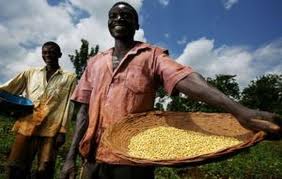Agriculture
Making Agriculture Work For Nigeria

The world as we know it today is a conglomeration of diverse races, all sustained by agriculture. A global issue cannot be more important when man’s nutrition is questioned. Food has sustained livelihood right from the rock ages to the renaissance times down to this age of information and technological zest. The discoveries of philosophers and the inventions of geniuses will have been a mirage if not for food to nourish our brains. Holistically the needs of man are innumerable and their importance varies based on the necessity of the prevailing circumstances. But just like air, all other needs cease to get consideration when hunger for food becomes an issue.
The world has its roots traced to Africa as legendary folklores have it. Humanity has witness different folds of evolution from the Stone Age to the agrarian period then, the machine revolution and now the age of information and technology; which is not just a contemporary innovation but with futuristic prospects. As we witnessed all these changes, more land is put to use, and the human population increased extensively. The quests by nations of the world to build monuments and edifice that cannot be rivaled continually shift the uses of available land space from food production. With technology, space is no longer a threat to agriculture but lesser interest grew from energetic youths, who make up the bulk of producers in the Africa. This decline is partly due to the sophistication of meeting up with the trendy acceptable packaging for products from advanced nations and partly because of poor linkages to market their harvest on time, after months of laborious toils. Africa seen as the continent with both the enabling environment and human capital to savage the global food crises is invariable reneging from its assigned role to the globe. Industrialist suffers raw materials short supply regularly.
The Nigeria scenario leaves more to be desired. A developing nation with ecological bliss and blessed with massive land space, makes one wonder what on earth had been our problem all the while. For it is anticipated that our agricultural potential should feed us, Africa and so many nations of continents. But here we are struggling with both standard of living and the cost of livelihood owing to our vague regards for agriculture. It is an ugly discomfort to know that an average Nigerian lives below a dollar per day. The fact that the oil wealth still leaves a large chunk of Nigerians either hungry or malnourished, is a pointer to the fact that we need to redirect our steps towards agriculture, focus on our limitations and revamp the sector to its pride and glory. So much has been said about food sustenance in Nigeria but, leaves much to be done to remedy the impending food crisis which we should fear more than a civil war.
The government of Nigeria has consistently spoken about making Agricultural a business, but until a serious roadmap is drawn to capture the interest of young people, achieving that big goal might take a while.




















